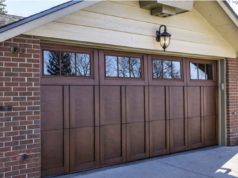Senate Passes Kirk Priorities for Drinking & Wastewater Systems, Flood Infrastructure & Protections for the Great Lakes
Kirk Bill to Protect and Restore the Ecosystem of the Great Lakes Included
WASHINGTON – (RealEstateRama) — U.S. Senator Mark Kirk (R-Ill.) today applauded the Senate’s passage of the Water Resources Development Act of 2016 (WRDA) which will improve drinking and wastewater systems, flood protection, waterway shipping, and the Great Lakes.
“Families in Illinois and across the country should not need to worry whether their drinking water is clean and safe. I fought to include my bill which directly funds programs for Great Lakes restoration and additional financing opportunities for communities to upgrade water infrastructure so no community experiences what happened in Flint ever again,” said Senator Kirk.
The American Society for Civil Engineers 2014 Report Card for Illinois gave Illinoisdrinking water infrastructure a C- and wastewater a D+. Schools in the Chicago and Waukegan school districts have also recently tested positive for high levels of lead. This bill will help to greatly improve water infrastructure to ensure safe drinking water for all communities.
“Shedd Aquarium would like to extend our gratitude to Senator Kirk for being a champion for the Great Lakes and the people and animals who depend on them, as exemplified in the Water Resources Development Act of 2016,” said Aislinn Gauchay, Assistant Director of Great Lakes and Sustainability at Shedd Aquarium. “This bipartisan act not only allows us to continue to restore the Great Lakes and protect its ecosystems, but also advances efforts to ensure trustworthy and clean drinking water for the 40 million people in the Great Lakes region.”
“Passage of Senate Bill 2848 provides a correction to a long-standing funding issue related to habitat restoration at Lockport Prairie Nature Preserve and protection for the federally endangered species that live there,” said Suzanne Hart, president of the Forest Preserve District’s Board of Commissioners. “We would like to thank Senator Kirk for all of his efforts on behalf of the Forest Preserve District of Will County and this important preserve. If approved, this legislation would conserve $320,000 in Forest Preserve capital funds that can be used for continued habitat restoration at Lockport Prairie and elsewhere throughout the District.”
The Water Resources Development Act of 2016 includes:
The Bipartisan S. 1024, Great Lakes Restoration Initiative: Kirk-authored bill to continue the Great Lakes Restoration Initiative Act (GLRI) through 2021, investing $1.5 billion in the Great Lakes, the drinking water source for over 30 million Americans, to tackle the threat of pollution and toxic contamination, and invasive species.
Permanent Set-Aside for the Great Lakes Navigation System (GLNS): Kirk-authored bipartisan amendment mandating that the GLNS receive at least a 10% allocation of Harbor Maintenance Trust Fund priority spending to make critical investments in reducing the backlog of maintenance projects like dredging, aging locks, and deteriorating breakwaters that threaten the efficiency of the Great Lakes transportation network.
Waterfront Community Revitalization & Resiliency: As a member of the Great Lakes Task Force, Kirk worked to support efforts to increase investment and business opportunities along all of the Great Lakes’ communities through a new coastal grant program authorized at $50 million per year through 2021.
Tools to Upgrade Aging Water Infrastructure to Ensure Clean Drinking Water:
Addresses Water Infrastructure Crises: $220 million in direct spending to states and communities across the country dealing with water infrastructure emergencies like Flint, MI.
Water Infrastructure Finance and Innovation Act (WIFIA) Program: Invests $70 million in funding to leverage as much as $4.2 billion in low-interest loans for construction of drinking water and wastewater infrastructure.
Health Programs To Address Lead Exposure: $50 million directed towards education addressing lead exposure.
Provides for Lead Testing In Schools & Daycare Centers: Authorizes $100 million over five years in grants for lead testing.
Assistance to Disadvantaged Communities: Authorizes $1.4 billion over five years plus $20 in direct spending grants for drinking water infrastructure for those most in need.
Increases Assistance for Replacement of Lead Pipes: Authorizes $300 million over five years and $20 million in direct spending grants to reduce lead in water.
Assistance For Sewer Overflow Control: Authorizes $1.8 billion over five years in grants to address sewer overflows and stormwater.
Flood Control Infrastructure & Ecosystem Restoration in Illinois:
Forest Preserve District of Will County (FPD): Saves the FPD up to $320,000 and allows continuation of the ecosystem restoration project, which is critical to the long-term stabilization and hydrologic management of the area’s groundwater by resolving a cost-share dispute between FPD and the U.S. Army Corps of Engineers. The dispute retroactively billed Will County for work it was not required to pay when the the Lockport Prairie Nature Preserve and Prairie Bluff Preserve project in Lockport began over a decade ago.
McCook Reservoir Completion: Directs the U.S. Army Corps of Engineers to expedite the completion of the Chicago Underflow Plan which will provide critical flood damage reduction benefits to 3.6 million people in 52 Chicagoland communities by providing $154 million per year. The project protects Lake Michigan, the drinking water source for millions in Illinois, from raw sewage pollution and improves the water quality of area rivers and streams with its series of deep underground tunnels and reservoirs capable of collecting 17.5 billions of gallons of sewage and stormwater.
Flood Mitigation for Upper Des Plaines River: Provides flood protection to about 1,000 Illinois homes and businesses, 400 structures across the watershed, and restore over 10 square miles of nationally significant aquatic habitat for a project that stretches across northeastern Illinois and southeastern Wisconsin. This series of new flood control measures along the Upper Des Plaines River, including levees, floodwalls, and reservoirs to alleviate millions in damages to homes and businesses in Lake and Cook Counties. This area experienced historic floods over the last 30 years and in April 2013, flooding on the Des Plaines River hit record levels, impacting hundreds of structures and causing road closures for days.
Upper Mississippi and Illinois Rivers Flood Risk Management: Includes a comprehensive study of the levees along the upper Mississippi and Illinois Rivers on a system-wide basis to improve flood protection and planning across Illinois levee and drainage districts. In 2009, U.S. Army Corps of Engineers acknowledged that a rehabilitation of a levee at a single location often cannot be cost-justified but each location is an integral part of a levee system that provides essential flood protection benefits. This provision in WRDA will help elevate and prioritize levee projects in Illinois which are critical to regional flood protection, but would otherwise be impeded by Army Corps of Engineers criteria.






